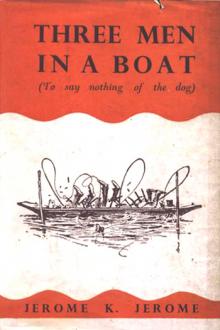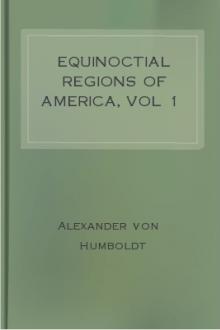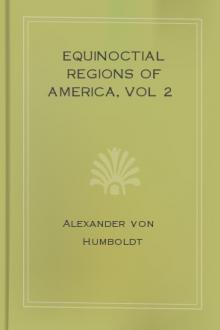Reise in die Aequinoctial-Gegenden des neuen Continents. Band 1.
Reise in die Aequinoctial-Gegenden des neuen Continents. Band 1.
HTML version with images available here.
Book Excerpt
pa zu verlassen; eine geheime Stimme sagte uns, daß wir uns wieder sehen würden. Diese Hoffnung hat uns nicht betrogen, und sie linderte den Schmerz einer langen Trennung. Ich verließ Paris mit den Entschluß, mich nach Algier und Egypten einzuschiffen, und wie nun einmal der Zufall in allen Menschenleben regiert, ich sah bei der Rückkehr vom Amazonenstrom und aus Peru meinen Bruder wieder, ohne das Festland von Afrika betreten zu haben.
Die schwedische Fregatte, welche Skiöldebrand nach Algier überführen sollte, wurde zu Marseille in den letzten Tagen Oktobers erwartet. Bonpland und ich begaben uns um diese Zeit dahin, und eilten um so mehr, da wir während der Reise immer besorgten, zu spät zu kommen und das Schiff zu versäumen. Wir ahnten nicht, welche neuen Widerwärtigkeiten uns zunächst bevorstanden.
Skiöldebrand war so ungeduldig als wir, seinen Bestimmungsort zu erreichen. Wir bestiegen mehrmals am Tage den Berg Notre
FREE EBOOKS AND DEALS
(view all)Popular books in Non-fiction, History, Travel
Readers reviews
4.0
LoginSign up
(I am a German native speaker) -Humboldts late work intended for the scientific interested German citizen, this work is a mixture of scientific theories, travel report, a bit of odd historical remarks, many many numbers (cyanometer to measure how 'blue' the heaven).
It is written in a very beautiful, oldfashioned German in a time between the 1st and 2nd German Empire. the described travel was than about half a century before.
Many words are written in a manner that would drive German teachers mad, but it is always perfect understandable, if one knows, that at that time many foreign words were not yet assimilated. Sometimes it is for the modern German reader a cause for amusement :). I personally love it! But that is individual.
It is sometimes tricky to differentiate between the scientific status quo of the time of the journey and that of the publication in this way. Humboldt looks back upon his own life and this travel as a scientist with an enormous reputation, it is betimes not easy to filter the memories from the young man travelling the world with the awe and spirit of looking at so many unknown natural phenomena through perspective of the old author who knew so much always better ;).
The first volume decribes the very much drawbacks (the political situation is around the year 1800 extremely complicated in Europe) which finally let to the journey into the south-american spanish colonies.
The trip over the Atlantic to the Canarian Islands, a short expedition to the Pic (the main volcano) and finally the main part: the arrival in the new worlds colonies.
Where he resides in a little spanish coast town, and one many weeks long expedition into the coastnear highlands and to native Indian tribes and the Catholic missions. The first volume ends with the return of this lengthy journey through the hinterland.
Humboldt always describes social, political, moral, economical, and scientific (botanic, zoologic, geological and geographical, chemical, physical, optical, and astronomical) aspects of places, situations, and people. Though this seems like a lot of aspects at which Humboldt was interested and made his observations it is that what made him one of the great among the sceintific world.
Sometimes one becomes a bit wary when many numbers in oldfashioned units are thrown into the text, but they are never without explanation or context.
A lot of scientific models are explained and tested with the observations made, so this is a rich source of the wildlife and historicosocial situation in the colonies.
Humboldts report is not so much an adventure travel report, he loved his instruments way to much to do something riskful. You need to be interested in Geography in general at least, because this is Humboldts main topic. His description of landscapes is often hidden behind numbers and too much scientific approach.
I had the PDF-version and I do not know if there is any free version with maps, images, tables availbale, which would the improve the reading experience exceedingly.
It is written in a very beautiful, oldfashioned German in a time between the 1st and 2nd German Empire. the described travel was than about half a century before.
Many words are written in a manner that would drive German teachers mad, but it is always perfect understandable, if one knows, that at that time many foreign words were not yet assimilated. Sometimes it is for the modern German reader a cause for amusement :). I personally love it! But that is individual.
It is sometimes tricky to differentiate between the scientific status quo of the time of the journey and that of the publication in this way. Humboldt looks back upon his own life and this travel as a scientist with an enormous reputation, it is betimes not easy to filter the memories from the young man travelling the world with the awe and spirit of looking at so many unknown natural phenomena through perspective of the old author who knew so much always better ;).
The first volume decribes the very much drawbacks (the political situation is around the year 1800 extremely complicated in Europe) which finally let to the journey into the south-american spanish colonies.
The trip over the Atlantic to the Canarian Islands, a short expedition to the Pic (the main volcano) and finally the main part: the arrival in the new worlds colonies.
Where he resides in a little spanish coast town, and one many weeks long expedition into the coastnear highlands and to native Indian tribes and the Catholic missions. The first volume ends with the return of this lengthy journey through the hinterland.
Humboldt always describes social, political, moral, economical, and scientific (botanic, zoologic, geological and geographical, chemical, physical, optical, and astronomical) aspects of places, situations, and people. Though this seems like a lot of aspects at which Humboldt was interested and made his observations it is that what made him one of the great among the sceintific world.
Sometimes one becomes a bit wary when many numbers in oldfashioned units are thrown into the text, but they are never without explanation or context.
A lot of scientific models are explained and tested with the observations made, so this is a rich source of the wildlife and historicosocial situation in the colonies.
Humboldts report is not so much an adventure travel report, he loved his instruments way to much to do something riskful. You need to be interested in Geography in general at least, because this is Humboldts main topic. His description of landscapes is often hidden behind numbers and too much scientific approach.
I had the PDF-version and I do not know if there is any free version with maps, images, tables availbale, which would the improve the reading experience exceedingly.
- Upvote (0)
- Downvote (0)

 Free Download
Free Download


































